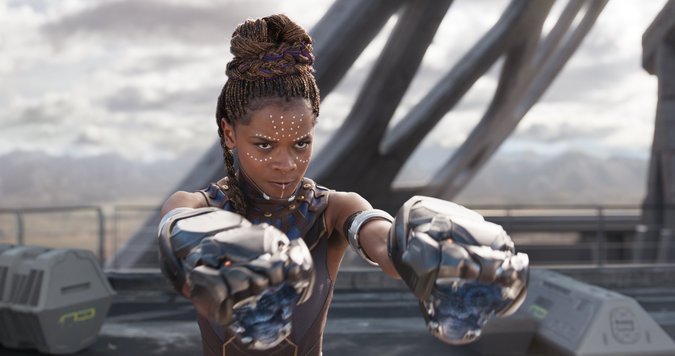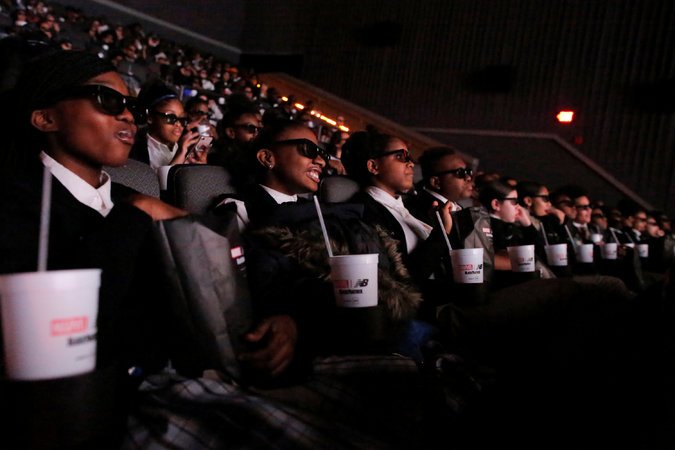There was never any doubt that “Black Panther” would rock the North American box office. Kevin Feige, the prodigy who runs Marvel, and Alan F. Horn, Disney’s movie chairman, have delivered one juggernaut after another. Robert A. Iger, Disney’s chief executive, took a personal interest in “Black Panther,” approving its $200 million production budget (at least 30 percent more than budgets for other Marvel nonsequels like “Doctor Strange” and “Ant-Man”) despite concern by some at Disney about sales of “Black Panther” toys.

“The concept of an African story, with actors of African descent at the forefront, combined with the scale of modern franchise filmmaking, is something that hasn’t really been seen before,” Mr. Coogler, the director, told The Hollywood Reporter. “You feel like you’re getting the opportunity of seeing something fresh, being a part of something new, which I think all audiences want to experience regardless of whether they are of African descent or not.”
[ALSO READ: Wakanda is a Fake Country, But The African Language in Black Panther is Real]
But no one quite knew how “Black Panther” would perform overseas.
Big-budget films that focus on black characters have long been held back by the Hollywood argument — a ridiculous one, in the eyes of many critics — that foreign audiences have little interest in films with largely black casts. It has been a self-fulfilling attitude; studios, ever fixated on what kinds of movies have succeeded in the past, never challenged the assumption with a big-budget fantasy because they were always too afraid to take the risk.
“Black Panther” arrived to very strong results in the United Kingdom, Belgium, Ukraine, South Korea, Mexico and Brazil, in many cases beating initial ticket sales for Marvel nonsequels based on lesser-known characters, including “Guardians of the Galaxy” in 2014.
“Black Panther” was softer in Germany, an important market, where the sadomasochistic “Fifty Shades Freed” outsold it.
“We’re extremely pleased with the reaction around the world, even more so because we face nothing competitively for a month,” said Dave Hollis, Disney’s president of distribution.

Disney will release “Black Panther” in Russia, China and Japan in the weeks ahead. Success in China, the world’s fastest-growing movie market, would be particularly sweet. If audiences there do not respond, however, it could have little to do with race. Hollywood imports are losing their luster in China as local studios become more skilled at making blockbuster-style movies. (Over the weekend in China, the locally produced “Monster Hunt 2” arrived to more than $130 million in ticket sales. Lionsgate gave it a 69-screen release in the United States, collecting $390,000.)
Advertisement
Continue reading the main story
[ALSO READ: Black Panther Cosplayers: ‘We’re Helping People See Us as Heroes’]
The frenzy surrounding “Black Panther” has been puzzling to some.
Newsletter Sign Up
Continue reading the main story
Thank you for subscribing.
An error has occurred. Please try again later.
You are already subscribed to this email.
“It’s an important chipping away at this Hollywood notion that somehow studios are taking a bigger risk if they cast nonwhite actors, but I don’t see it as a profound change,” said Todd Boyd, a cinema and media studies professor at the University of Southern California who focuses on popular culture and race. “I ultimately see it as exploiting a profitable niche.”
“To me, there is real change afoot when diverse actors are cast in roles that are not inherently diverse,” Mr. Boyd added.
But many people stood in line to praise Disney for pushing toward more diverse filmmaking. Richard Gelfond, chief executive of Imax, the large-format movie exhibitor, which played “Black Panther” in more than 60 countries, championed Disney for delivering “content that is compelling on its face but also bridges the gap between different cultures, and ultimately is a reflection of the shared values of moviegoers all over the world.”
Phil Contrino, director of media and research for the National Association of Theater Owners, noted the power of seeing “Black Panther” in a communal setting on a big screen. “Hopefully someday we’ll look back at the release of ‘Black Panther’ as the turning point when diversity and positive representation in blockbusters switched from being an anomaly to being normal,” Mr. Contrino said.
And Stacy L. Smith, an author of blistering studies about Hollywood’s lack of diversity, wrote on Twitter in a message to Mr. Iger, who has made inclusion a priority across Disney: “We have been watching; lead supporting roles have been changing as well as behind the camera. There is more to be done but this weekend is a giant leap forward.”
Continue reading the main story
Article source: https://www.nytimes.com/2018/02/18/movies/black-panther-box-office-records.html?partner=rss&emc=rss
Speak Your Mind
You must be logged in to post a comment.